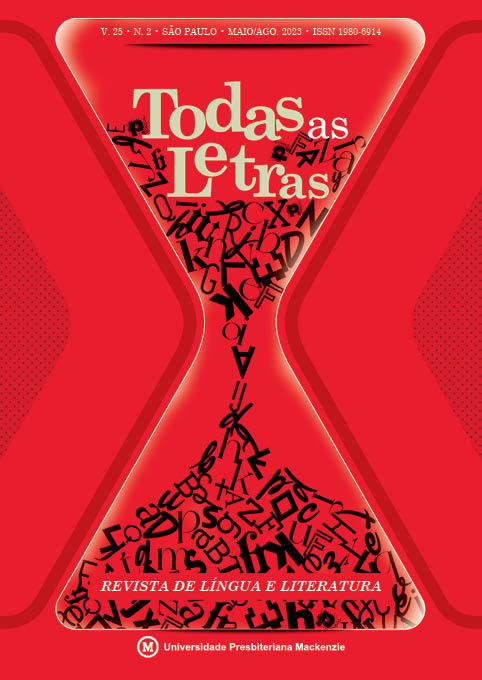A suposta busca da versão “verdadeira” de um conto de fadas como provocação reflexiva metaficcional na esteira do possível
Keywords:
Contos de fadas, Metaficção, Chapeuzinho Vermelho, Literatura e conhecimento, Verdade do possívelAbstract
The search for a supposedly “original” version of traditional fairy tales seems to be, within the research of the genre, as fascinating as the textualities that make it up. Both the persistent attempts to delimit and circumscribe the creative role played by, for example, Charles Perrault and the Grimm Brothers, in their literary versions of these narratives, as well as the search for records of oral versions that preceded them, denounce the notable interest in a Cartesian pursuit of the supposed “truth” of fairy tales that, in some ways, paradoxically contradicts the kind of knowledge in which art and literature themselves consist: the scope of a superior and idiosyncratic form of knowledge governed by the branches of the possible truth. Here, inspired by Chapeuzinho Vermelho: a verdadeira história, by AR Almodóvar and Marc Taeger, we analyze to the development of the reflections that it, as a metafictional textuality, raises about itself and its nature by showing us its own engines.
Downloads
References
AGENCE BIBLIOGRAPHIQUE DE L’ENSEIGNEMENT SUPÉRIEUR – SUDOC. 2021. Disponível em: http://www.sudoc.abes.fr/cbs/xslt/DB=2.1//SRCH?IKT= 12&TRM=158000005&COOKIE=U10178,Klecteurweb,D2.1,E20e7605b-138,I2 50,B341720009+,SY,QDEF,A%5C9008+1,,J,H2-26,,29,,34,,39,,44,,49-50,, 53-78,,80-87,NLECTEUR+PSI,R177.33.34.177,FN. Acesso em: 13 out. 2021.
ALBUQUERQUE, J. Por que o conhecimento adquirido com a literatura é diferente de aprender jardinagem. Folha de S.Paulo, São Paulo, 1o jun. 2021. Disponível em: https://www1.folha.uol.com.br/colunas/juliana-de-albuquerque/ 2021/06/por-que-o-conhecimento-adquirido-com-a-literatura-e-diferente-deaprender-jardinagem.shtml. Acesso em: 11 out. 2021.
ALMODÓVAR, A. R.; TAEGER, M. Chapeuzinho Vermelho: a verdadeira história. Tradução de Thais Rimkus. São Paulo: Callis, 2009.
ALMODÓVAR, A. R. La verdadera historia de Caperucita. Sevilha: Kalandraka, 2004.
AMAZON. Chapeuzinho vermelho: a verdadeira história. 2021. Disponível em: https://www.amazon.com.br/Chapeuzinho-Vermelho-Verdadeira-Hist%C3% B3ria-Almodovar/dp/8598750352/ref=sr_1_5?__mk_pt_BR=%C3%85M% C3%85%C5%BD%C3%95%C3%91&crid=3
TV3BON84Z6M&dchild=1&keywords=a+verdadeira+hist%C3%B3ria+da+chapeuzinho+vermelho&qid=1634169267&sprefix=chapeuzinho+vermelho+a+verdadeira+%2Caps%2C307& sr=8-5. Acesso em: 13 out. 2021.
BERNHEIMER, K. Fairy tale is form, form is fairy tale. In: ALLISON, D. et al. (org.). The writer’s notebook: craft essays from Tin House. Portland: Tin House Books, 2009. p. 61-73.
BOTTIGHEIMER, R. B. Fairy tales: a new history. New York: Excelsior Editions, 2010.
CAMPAGNO, M. These books made me really curious: how visual explorations shape the young reader’s taste. In: EVANS, J. (org.). Challenging and controversial picturebooks: creative and critical responses to visual texts. London: Routledge, 2015. p. 121-143.
CHKLOVSKI, V. A arte como procedimento. In: TOLEDO, D. de O. (org.). Teoria da literatura: formalistas russos. 3. ed. Porto Alegre: Globo, 1976. p. 39-56.
COELHO, N. N. Literatura: arte, conhecimento e vida. São Paulo: Peirópolis, 2000.
DARNTON, R. O grande massacre de gatos e outros episódios da história cultural francesa. São Paulo: Graal, 1986.
FARIA, M. L. G. de. Literatura: uma forma superior de conhecimento. Metamorfoses, Rio de Janeiro, v. 13, n. 2, p. 143-156, 2015.
HUTCHEON, L. Narcissistic narrative: the metaficcional paradox. Waterloo: Wilfrid Laurier University Press, 1980.
JAKOBSON, R. Linguística e poética. In: JAKOBSON, R. Linguística e comunicação. São Paulo: Cultrix, 1975. p. 118-162.
JEAN, L. O paradoxo de Charles Perrault: como contos de fadas aristocráticos se tornaram sinônimo de conservação folclórica. Literartes, São Paulo, v. 1, n. 12, p. 295-308, 2020.
KÜMMERLING-MEIBAUER, B. Die Kunstmärchen von Hofmannsthal, Musil und Döblin. Weimar: Böhlau, 1991.
NAVAS, D. Metaficção e a formação do jovem leitor na literatura infantil e juvenil contemporânea. Linguagem: Estudos e Pesquisas, Goiânia, v. 19, n. 1, p. 83-95, 2015.
NIKOLAJEVA, M.; SCOTT, C. Livro infantil ilustrado: palavras e imagens. São Paulo: Cosac Naify, 2011.
PABST, S. Zerstreute Autorschaft: Anonymität als Autorisierungsfunktion Grimmscher Märchen. Fabula, Berlin, v. 55, n. 1/2, p. 135-152, 2014.
SANTAELLA, L. A pós-verdade é verdadeira ou falsa? São Paulo: Estação das Letras e Cores, 2018.
SANTAELLA, L. Literatura como forma de conhecimento. Ciência e Cultura, Rio de Janeiro, v. 72, p. 19-23, 2020.
SANTAELLA, L. A pós-verdade na era das fake news e deep fake. Curso livre [on-line]. Espaço Cult, São Paulo. Carga horária: 10 horas. Dias do curso: 14, 15, 16, 17, 17 jun. 2021, às 19 horas.
STOKER, P. Theorie der intertextuellen Lektüre: Modelle und Fallstudie. Paderborn: Ferdinand Schöningh, 1998.
UTHER, H.-J. Handbuch zu den “Kinder- und Hausmärchen” der Brüder Grimm: Entstehung, Wirkung, Interpretation. 2. ed. Berlin/Boston: De Gruyter, 2013. ZIPES, J. The trials and tribulations of Little Red Riding Hood. New York: Routledge, 1993.
Downloads
Published
How to Cite
Issue
Section
License
Copyright (c) 2023 André Luiz Ming Garcia

This work is licensed under a Creative Commons Attribution-NonCommercial 4.0 International License.
The originals accepted and published become property of Mackenzie Presbyterian University, being forbidden their total or partial reproduction without permission of the Editorial Board, except for study and research.




